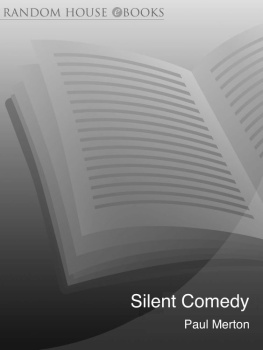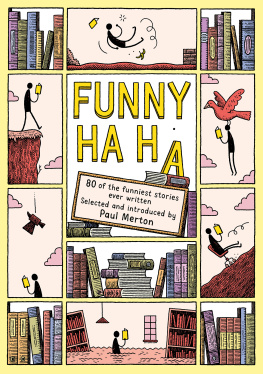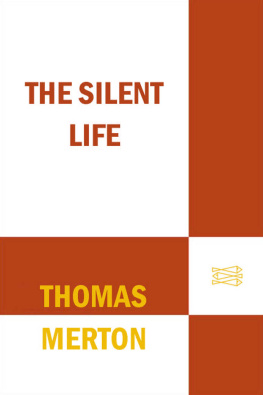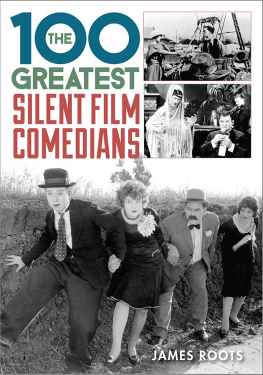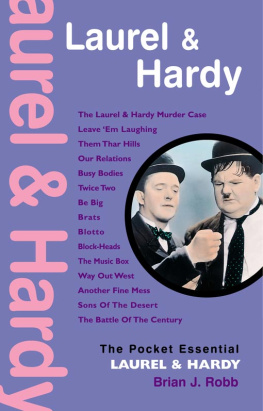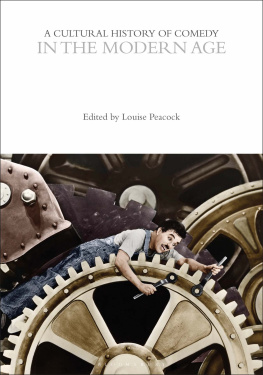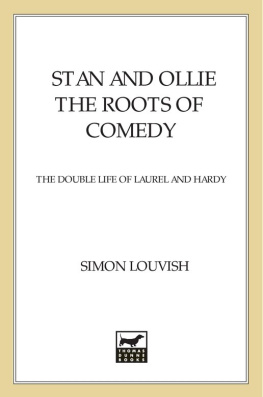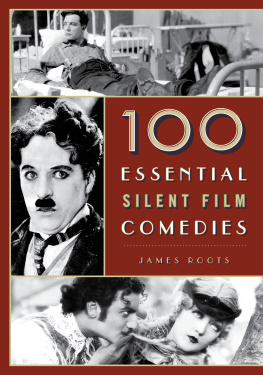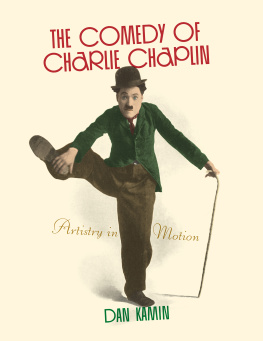Silent
Comedy
PAUL MERTON

Contents
This eBook is copyright material and must not be copied, reproduced, transferred, distributed, leased, licensed or publicly performed or used in any way except as specifically permitted in writing by the publishers, as allowed under the terms and conditions under which it was purchased or as strictly permitted by applicable copyright law. Any unauthorised distribution or use of this text may be a direct infringement of the authors and publishers rights and those responsible may be liable in law accordingly.
Version 1.0
Epub ISBN 9781409035664
www.randomhouse.co.uk
Published by Arrow Books 2009
2 4 6 8 1 0 9 7 5 3 1
Copyright Paul Merton 2007
Paul Merton has asserted his right under the Copyright, Designs and Patents Act, 1988, to be identified as the author of this work
This book is sold subject to the condition that it shall not, by way of trade or otherwise, be lent, resold, hired out, or otherwise circulated without the publishers prior consent in any form of binding or cover other than that in which it is published and without a similar condition, including this condition, being imposed on the subsequent purchaser.
First published in Great Britain in 2007 by
Random House Books
Random House, 20 Vauxhall Bridge Road,
London SWIV 2SA
www.rbooks.co.uk
Addresses for companies within The Random House Group Limited can be found at: www.randomhouse.co.uk/offices.htm
The Random House Group Limited Reg. No. 954009
A CIP catalogue record for this book is available from the British Library
ISBN 9780099510130
The Random House Group Limited supports The Forest Stewardship Council (FSC), the leading international forest certification organisation.
All our titles that are printed on Greenpeace approved FSC certified paper carry the FSC logo. Our paper procurement policy can be found at www.rbooks.co.uk/environment
Design by Dinah Drazin
Typeset by
Palimpsest Book Production Limited, Grangemouth, Stirlingshire
Printed and bound in Great Britain by
CPI Bookmarque, Croydon CRO 4TD
About the Author
After a spell as a civil servant Paul Merton began his standup career in 1982 at Londons Comedy Store and still regularly performs both there and at the Edinburgh Festival. For many years he has been team captain on BBC1s Have I Got News For You, for which he won a BAFTA in 2003, and he has hosted Room 101 on BBC2. Some of Pauls other television credits include Paul Merton The Series I & II, Paul Merton in China and Paul Merton in India and he has published two previous books: Paul Mertons History of the Twentieth Century and a spoof autobiography, Paul Merton My Struggle. Paul is also a regular panellist on BBC Radio 4s Just A Minute. He has been a lifelong fan of silent comedy, and his much-acclaimed series Silent Clowns was first broadcast in 2006 on BBC4.
Praise for Silent Comedy
***** Such is Mertons enthusiasm that his story grips throughout.
Mail on Sunday
Lovingly researched, beautifully designed and gloriously illustrated.
Daily Telegraph
His inside tracks on such classics as The Tramp, The Gold Rush, Steamboat Bill Junior and Modern Times are deep and serious pleasures ... a terrific history of props and pratfalls ... Im a better person for having read this.
The Times
He brings an insiders insight to this heartfelt study ... its a good sign when such a substantial book leaves you wanting still more.
Independent
Shaped by Mertons enthusiasm, this is a wonderful introduction to a world of comedy.
Herald
He makes some striking biographical connections the rest of us have missed ... he certainly knows his subject.
Kevin Brownlow, Spectator
Such is Mertons exhaustive affection, youll feel a pang when the talkies come in.
Word
Encyclopaedic knowledge, awed respect and lavish illustrations.
Saga magazine
**** Penned with genuine passion, this is a surprisingly solid read that is both well-crafted and carefully researched, with the added plus of some truly sumptuous stills.
Film Review
For Suki
Introduction
I ve always enjoyed visual comedy. When I was five I was taken to Bertram Mills Circus. At that age the leggy, glamorous trapeze artiste held no sway over me, but ah, the clowns, what an impression they made! Colourfully clothed adults, with painted faces, unfeasibly large boots, driving easily collapsible cars and throwing buckets of whitewash over each other I was filled with rapturous glee. It was a major revelation in my life to discover that adults got up to this level of silliness. I still recall the all-embracing sound of a big top filled with laughter, the intoxicating roar of happy people. At that moment was born a desire to live in that laughter, somehow to be part of its creation, to engender that sound in people, to flood their brains with endorphins.
At my urging, my mother bought a plastic clown mask as a memento. I wore it more or less constantly over the next few days. It was a crude, moulded face that tore easily, exposing sharp edges to my young skin. Even though it hurt, I still put it on. Im aware of the massive symbolism now, but then it was just a torn clown mask that caused a bearable amount of irritation as I tumbled behind and across the sofa. I easily recall the difficulty of breathing through the rudimentary nose two holes, optimistically, but inaccurately, placed somewhere in the vague vicinity of a childs nostrils.
A thirst for comedy led me to Charlie Chaplin, whose early Keystone films were shown on television in a puzzling world of black and white shadows. My grandfather told me that Charlie Chaplin had been the funniest man in the world, yet there seemed little evidence on the screen in front of me: the poor quality print was too dark to reveal what was happening. Shown at the wrong speed with awful, unsympathetic music, it just didnt give Charlie a chance.
A programme called Mad Movies, hosted by the comedian Bob Monkhouse, appeared on British television in 1965. It introduced me to more Chaplin, Laurel and Hardy, Mack Sennett, Harry Langdon, Mabel Normand, Roscoe Arbuckle and cross-eyed Ben Turpin. Then in 1968 the comedian and life-adventurer Michael Bentine presented the Golden Silents on the BBC. The ex-Goon had a passion for visual humour, and for the first time I saw Buster Keaton, who had been kept out of the Mad Movies series by contractual problems. Seeing Keatons work was a revelation. I thought I was an eleven-year-old kid who knew a fair amount about silent comedy. I wasnt. I was an eleven-year-old who had never seen Buster Keaton: his incredible acrobatic abilities; his stillness; his extraordinary stunts; his surrealism; his dedication to his work; his comedy.
The Golden Silents inspired in me a desire to collect silent comedies in those days they were on a film format called Super 8. I had a projector in my bedroom and a sheet on the wall, but very few films were available. Three years later, I saw my first silent comedy on a big screen with a live accompaniment when Buster Keatons The General was shown at the Academy Cinema in Oxford Street. It was a tremendous eye-opener: silent, visual comedy on the big screen comes alive in a way that television struggles to match. The presence of a large, appreciative audience creates an atmosphere of laughter.

